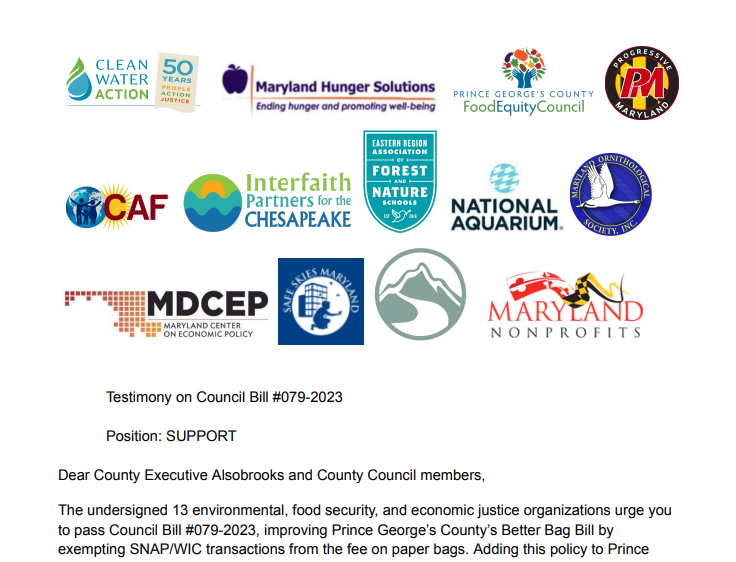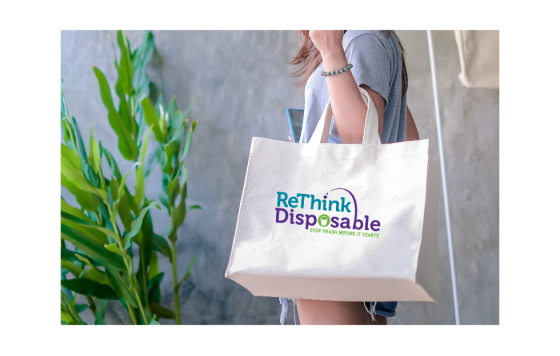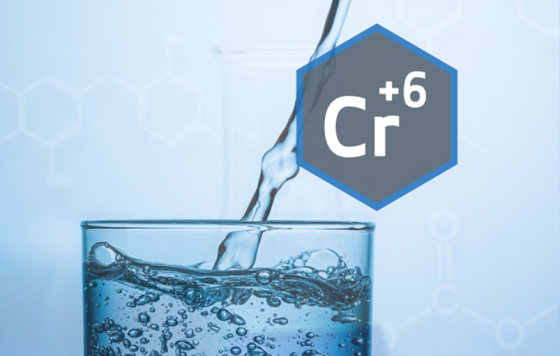
In June, Prince George’s County Council passed a “Better Bag Bill:” legislation to ban plastic bags and place a 10 cent charge on paper bags. Bills like these are an important step forward for the environment and great Zero Waste policy - but must be made in coalition with food access and equity organizations to ensure that any potential concerns are addressed.
Unfortunately, the demands of food access and equity organizations were not heard in the initial Better Bag Bill that passed this summer. When fees are charged for paper bags, it's important to take into account how this impacts people using SNAP/WIC: federal rules mean that SNAP/WIC funds can't be used to pay for bag fees. Prince George's County's Better Bag Bill, as it passed this summer, allows for cash and credit customers to get a paper bag for a small fee in a pinch; but without a fee exemption, many SNAP/WIC customers will find themselves unable to get a bag at all when it's really needed. That's not equitable. Fortunately, there's a simple, proven solution: a targeted fee exemption for SNAP/WIC transactions. Many states, counties, and cities across the country have included this equity exemption in bag legislation with great success. Now, Councilmember Oriadha has introduced legislation to exempt transactions using SNAP/WIC from the paper bag fee to address the demands of food access and environmental justice stakeholders before the Better Bag Bill goes into effect in January.
We're working with Maryland Hunger Solutions, the Prince George's County Food Equity Council, Centro de Apoyo Familiar, and many economic justice and environmental partners to support Councilmember Oriadha's legislation and add the SNAP/WIC fee equity exemption to the bill. Click here to email your County Council representatives and County Executive Alsobrooks in support of the bill; click here to sign your organization on to joint comments; and to learn more about this issue, read our testimony and the joint sign on testimony below!
~~~~~~
Testimony on Council Bill #079-2023
Position: SUPPORT
Dear County Executive Alsobrooks and County Council members,
The undersigned 13 15 environmental, food security, and economic justice organizations urge you to pass Council Bill #079-2023, improving Prince George’s County’s Better Bag Bill by exempting SNAP/WIC transactions from the fee on paper bags. Adding this policy to Prince George’s County’s environmental efforts will avoid placing disproportionate burdens on low-income customers, follows best practices across the country, and will make Prince George’s County a leader in environmental and economic justice in Maryland.
Eliminating plastic bags and promoting the use of reusable bags are great environmental goals. Like other plastic products, plastic bags contribute to greenhouse gas emissions and environmental justice concerns at every stage of production and disposal, worsening the climate crisis, and they cannot be effectively or efficiently recycled. Reducing single-use bag use is an important upstream solution that protects our environment and helps build toward a zero waste future. But as we craft policies to improve the environment, we must avoid placing the highest burden on Prince George’s County’s lowest-income residents. Amending the Better Bag Bill to exempt SNAP/WIC transactions from the fee on paper bags, as Council Bill #079-2023 does, is necessary.
The Better Bag Bill places a 10-cent fee on all customers, without regard for how that fee may impact different customers differently. Unfortunately, such a fee is disproportionately burdensome for customers buying their groceries with SNAP and WIC, because federal rules do not allow SNAP and WIC funds to pay for paper bag fees. The fee on paper bags is designed to be a reminder for most customers paying in cash or credit to bring reusable bags, but not an significant financial burden or practical barrier to carrying groceries home: paper bags will be available for a nominal fee designed not to be financially burdensome for most customers.
However, this fee poses a real financial burden and practical barrier to customers paying for groceries with SNAP and WIC, because unlike cash & credit customers, many SNAP & WIC customers will find themselves unable to get paper bags at all when they have forgotten reusable bags if required to pay a cash fee. Distributing reusable bags to SNAP & WIC customers is a valuable step to take, but not a solution to this problem: it does not address the increased difficulty of bringing reusable bags for customers using public transportation rather than a car, and it does not address the practical inequality of outcomes when a customer forgets a reusable bag. Such a policy that places much more difficult expectations and much heavier burdens on low-income customers than other customers is the exact definition of an inequitable policy.
Fortunately, there’s a simple, proven solution: to exempt customers paying with SNAP/WIC from the paper bag fee. We know that this works: stores can incorporate the fee exemption easily into the flow of a SNAP/WIC transaction, and states like California, Colorado, New York, Oregon, and Washington, as well as many cities and counties across the country, have already implemented this policy without issue for years. Please add this fee exemption before the Better Bag Bill takes effect in the new year, and make Prince George’s County a leader in environmental justice.
Sincerely,
Maryland Hunger Solutions
Prince George's County Food Equity Council
Centro de Apoyo Familiar (Center for Assistance to Families)
Maryland Center on Economic Policy
Maryland Nonprofits
Progressive Maryland
Clean Water Action
National Aquarium
Eastern Region Association of Forest and Nature Schools
Maryland Ornithological Society
Safe Skies Maryland
Center for Nature-Informed Therapy
Interfaith Partners for the Chesapeake
Update: the following organizations signed on after the deadline to upload testimony:
Iglesia ACTS
Yada Casa de Adoración y Avivamiento
~~~~~~
September 27, 2023
Testimony on Council Bill #079-2023
Position: SUPPORT
Dear members of the Transportation, Infrastructure, Energy, and Environment Committee,
Clean Water Action is a national environmental organization with 53,000 members in the state of Maryland. Our mission is to protect our environment, health, economic well-being and community quality of life. In Maryland, much of our work focuses on solid waste management. We coordinate work to transition Maryland communities away from trash incineration and landfilling toward Zero Waste solutions that are better for our climate, our environment, and our health.
We strongly support legislation to transition away from plastics and plastic bags, and we also believe that such legislation can and must have equity as a primary goal. That is why we support Council Bill 79-2023 to make Prince George’s County’s Better Bag Bill more equitable before it goes into effect in January. Exempting SNAP/WIC transactions from the paper bag fee is both possible and necessary: it helps to avoid inequitable impacts of the paper bag fee that would disproportionately burden SNAP/WIC customers in comparison to other customers, and it strikes an appropriate balance between the various environmental and food access stakeholders of concern when discussing transitioning away from plastic bags.
Many jurisdictions across the country have passed legislation to reduce single-use bag use that includes a fee on bags with a fee exemption for SNAP/WIC transactions, and we know from these jurisdictions that this is a policy tool that can be implemented in practice without examples of negative consequences. Examples of locations that have included the SNAP/WIC fee exemption include California; Colorado; New York; Oregon; Washington; Anchorage AK; Andover MA; Chicago IL; Duluth MN; Edwardsville IL; Minneapolis MN; Santa Fe NM; and Taos NM. Clean Water Action, as a national organization, has offices in several of these locations. In recent months, we have made a special effort to discuss this issue with Clean Water Action staff members in California and in Minnesota. They informed us that in their states, the SNAP/WIC fee exemption had broad support among the environmental community as a common-sense equity measure, and had not been a contentious issue. They also shared that they had not heard of any negative repercussions to businesses or otherwise from implementing the SNAP/WIC fee exemption in their locations.
In contrast, jurisdictions across Maryland have already passed legislation similar to Prince George’s County’s Better Bag Bill, with a fee on paper bags but without a fee exemption for SNAP/WIC transactions, and we know from experience in these locations that failing to include the SNAP/WIC fee exemptions does indeed do harm, disproportionately burdening SNAP/WIC customers needlessly. These experiences also show that distributing reusable bags is not enough to address this inequity: an equitable Better Bag Bill must include both reusable bag distribution and the SNAP/WIC fee exemption.
Our office was particularly involved in the passage of Baltimore City’s plastic bag ban in 2019-2020. When the bill was introduced, it included the SNAP/WIC fee exemption as a broadly supported best practice. However, the City Council amended the legislation to eliminate the SNAP/WIC fee exemption, promising to distribute reusable bags instead. These were not empty promises: the City government committed and followed through on a very robust reusable bag distribution program, involving city offices, elected officials, and partners. The City took this commitment to distribute reusable bags so seriously that it delayed the implementation of the legislation, twice, because early-pandemic supply chain disruptions meant that the city could not acquire reusable bags to distribute for quite some time. The City did not implement the bill until it could distribute reusable bags adequately, and they ultimately did a very robust reusable bag distribution. This experience demonstrated that reusable bag distribution is not enough: coalition members in Baltimore City have personally witnessed customers who are using SNAP/WIC being unable to obtain a paper bag when it’s necessary. Our staff have received questions and complaints at community meetings about the application of the paper bag fee on SNAP/WIC transactions and the unequal consequences when someone using SNAP/WIC forgets a reusable bag, compared to someone paying in cash or credit who can obtain a paper bag much more easily when they forget. Without the SNAP/WIC fee exemption, we know from experience that the Better Bag Bill will have inequitable impacts, placing an unnecessary disproportionate burden on SNAP/WIC customers compared to cash/credit customers.
Fortunately, Prince George’s County is in the position right now to learn from the positive examples of jurisdictions across the country and the negative examples of other jurisdictions across Maryland, and add the SNAP/WIC fee exemption to the Better Bag Bill before it is implemented. Prince George’s County can learn from the mistakes of neighboring jurisdictions and lead the state on environmental justice and equity on this issue. Passing Council Bill #079-2023 now, before the Better Bag Bill goes into effect, is the right move: it will reduce confusion to launch the Better Bag Bill with the SNAP/WIC fee exemption already in place, rather than have to amend the law afterwards.
We also suggest that the Council add a stipulation that the signage required by the bill include the information that SNAP/WIC transactions are exempt from the fee. Examples of signage that includes information about a SNAP/WIC bag fee exemption can be found on the City of Denver’s Checklist for Retailers, Poster, Point of Sale Placard, and Cashier Sheet.
Please pass Council Bill #079-2023 and add the SNAP/WIC fee exemption to the Better Bag Bill to make Prince George’s County a leader in Maryland on equitable Zero Waste action and environmental justice.
Sincerely,
Gabrielle Sanchez
Clean Water Action
Maryland Organizer



